- Hélène-Christine Prause (International Exchange)
- Miran Lemmerer (International Exchange)
- Iakovos Saridakis (International Exchange)
- Mathias Gotsmy (International Exchange)
- Patricia Bortel (International Exchange)
- Aleksandra Ptaszek (International Exchange)
- Yifan Bao (International Exchange)
- Martin Schaier (International Exchange)
- Nina Nicole Troppmair (International Exchánge)
- Lisa Panzenboeck (International Exchange
Hélène-Christine Prause
Hélène received the International Exchange Award in 2021 and stayed in Baltimore, USA in the lab of Allen Place (University of Maryland, Center for Environmental Sciences, Institute of Marine and Environmental Technology (IMET)) for the project: The hemolytic potential of A-, B-, and C-type prymnesins (PRMs) and karmitoxin, and their interaction with different sterol structures
Read here about her experience:
Why did you apply for the International Exchange Programme?
The DoSChem exchange program is targeted at PhD students at the Faculty of Chemistry of the University of Vienna which largely increases the chances for funding. Also, the DoSChem grant does not impose strict rules or restrictions regarding topic of research or host institute/country, broadening the possibilities for collaboration.
What was your project and where did you go? Was the project successful? What was the outcome?
Prymnesins (PRMs) and karmitoxin are potent microalgal ichthyotoxins produced by the harmful algal bloom forming algae Prymnesium parvum and Karlodinium armiger respectively. Their modes of actions remain unclear, but membrane interactions seem crucial. We found that all microalgal toxins were hemolytic. Surface plasmon resonance showed affinity of A- and B-type PRMs and karmitoxin to selected sterols. The project was considered successful and will be continued at the University of Vienna.
What did you like/did you not like about your International stay?
- work with one of the most renown researchers and learning first hand from their experience
- connect with fellow PhD students from all over the world
- learn about their research and helping out with projects that are different from my own
What did you get out of participating in the international exchange? Would you do it again?
- opened mind and doors to future career options
- adaptability to new work environments and management
- more passion and ideas for PhD project
- I would absolutely do it again
How did the daily work routine in your host lab differ from the lab in Vienna?
The group environment is less hierarchical; students and Prof. Place are on eye-level, making discussions about projects less one-sided, less proposal/approval-like, but more of an open conversation about sharing ideas and finding the best option for both parties. We all had very a friendly relationship with Allen, and went to fun group lunches and road trips (for fieldwork) together. Place Lab also gives PhD students more freedom regarding their time & work schedule.
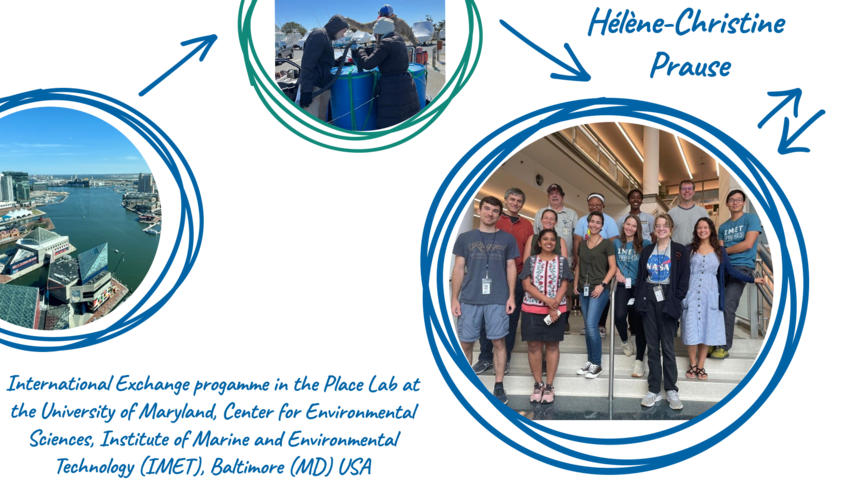
left: View of the Inner Harbor in Baltimore; middle: Collecting water for microalgal culture (at -15°C); right: Place Lab group (© H.C. Prause)
Miran Lemmerer
Miran received the International Exchange Award in 2021 and stayed in the group of Hideki Yorimitsu at the Kyoto University, Japan in summer 2022. The title of the project was Construction of complex g-lactams via an interrupted Corey–Chaykovsky/Smiles rearrangement cascade.
Read here about his experience in a japanease laboratory:
Why did you apply for the International Exchange Programme?
To conduct our experiments within the group of Prof. Hideki Yorimitsu, and more general, to get to know a different research and life environment on the other side of the globe.
What was your project and where did you go? Was the project successful? What was the outcome?
To investigate aryl migration reactions for the synthesis of fine chemicals I performed this four-month internship at the Kyoto University in Japan. While our initial idea in the proposed “Construction of complex g-lactams via an interrupted Corey–Chaykovsky/Smiles rearrangement cascade” did not turn out as expected, the inspiration from and expertise by the Yorimitsu group members allowed for the project to take a different, more successful direction. In this context, a new reaction path was found which is currently under collaborative investigation by both, the Maulide- and the Yorimitsu group.
What did you like/did you not like about your International stay? What did you get out of participating in the international exchange? Would you do it again?
Traveling within the still active, strict, covid-related, general entrance restrictions of Japan was quite a tedious process because the stay had to be postponed several times. However, the experience was worth the hassle. I met amazing new people who welcomed me with open arms all within a completely different culture and lifestyle. Without a doubt, I would do it again.
How did the daily work routine in your host lab differ from the lab in Vienna?
In Vienna, I am used to smaller labs and offices while in Kyoto the whole group shared one big lab. As the general working hours are quite different than in Austria, also the life outside the lab is structured accordingly, for example with shops open at all times. Meals in restaurants are not only incredibly delicious, but also much more affordable giving convenient access to mouth-watering food even when living in a small flat without a personal kitchen.
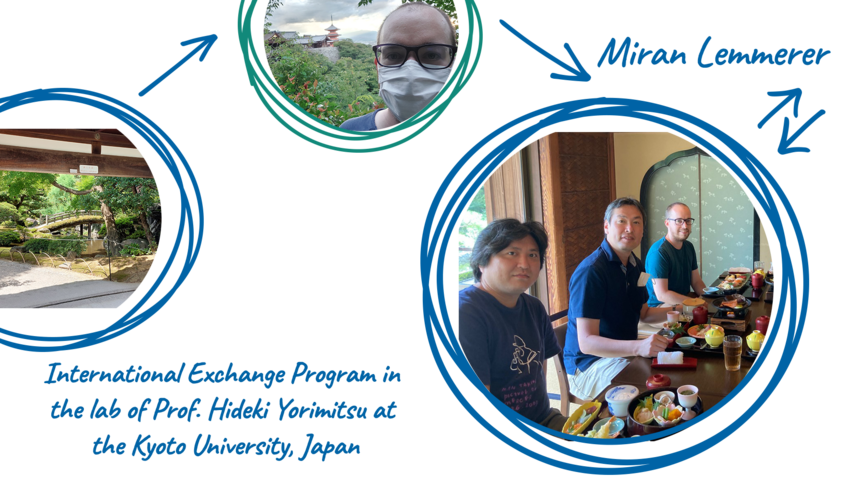
left: Emperors garden; middle: Kiyomizu-dera temple (© M. Lemmerer); right: left to right; Prof. Takashi Kurogi, Prof.Hideki Yorimitsu, Miran Lemmerer(© H. Yorimitsu)
Iakovos Saridakis
Iakovos received the International Exchange Award in 2022 and stayed three months at RWTH Aachen University in the lab of Daniele Leonori to persure his project:Halogen-atom transfer-enabled metal catalysis.
Read here about his experience:
Why did you apply for the International Exchange Programme?
After three years of my doctoral studies, I was eager for an international stay. I wanted to broaden the horizons of my knowledge in chemistry, working in a subdiscipline out of my expertise. Gladly, my supervisor emphasizes on our personal and professional development and supported me. Hence, while pursuing funding to support my stay, the DoSChem I. E. Programme appeared to me as a great opportunity, both financially and in a prestige manner: I consider exceptional to be recognized and supported by your own institution in order to embark on scientific endeavors at a different place.
What was your project and where did you go? Was the project successful? What was the outcome?
First, let me begin with the fact that I am an organic chemist under the supervision of Prof. Nuno Maulide, working at one of the most project-diverse laboratories globally! Yet, my enthusiasm and endless interest to explore and learn new aspects of chemistry inspired me to this endeavor. With Prof. Daniele Leonori at RWTH Aachen University (Germany) I was working on photochemistry. Essentially, we were utilizing visible light to perform otherwise elusive chemical transformations for the synthesis of drug-like molecular architectures. We were excited to see that the project worked well! The work will be soon submitted to a prestigious scientific journal.
What did you like/did you not like about your International stay? What did you get out of participating in the international exchange? Would you do it again?
The international exchange enriched the portfolio of my scientific skills, allowed me to connect with people in various disciplines at RWTH Aachen University and, importantly, communicate my doctoral research. Truly, there are no significant drawbacks for realizing this research stay abroad. Yes, I would definitely do it again. It is a unique opportunity to create network, explore yourself professionally, challenge your knowledge and empower your career.
How did the daily work routine in your host lab differ from the lab in Vienna?
Both research groups are well-established and consist of approximately 30-membered teams, with similar work-load, opportunities, responsibilities, and way of function. I had to collaborate with a wonderful team of people who embraced me and contributed to a smooth daily routine, with scientific discussions, problem solving exercises.
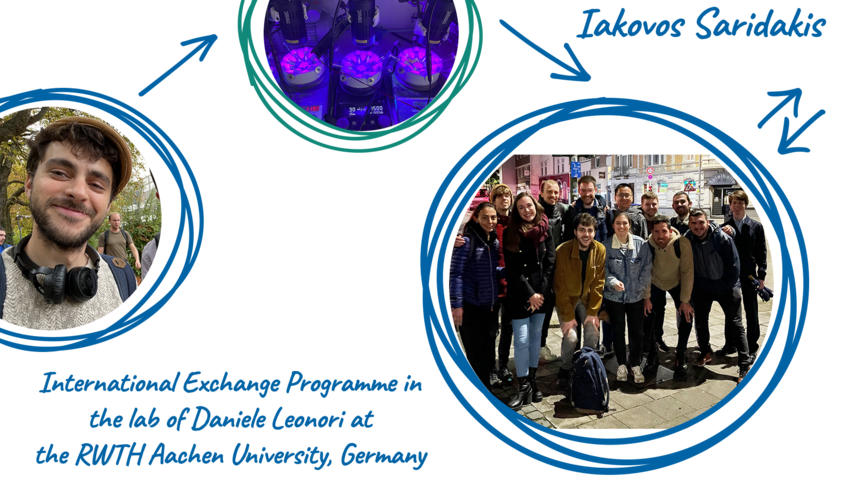
Mathias Gotsmy
Mathias (Jürgen Zanghellini group, Panel B) received the International Exchange Award in 16.01.2023 and spent 3 months in spring 2023 on the project titled "Optimal Design of a Three-Stage Biotechnological Production Process", in the group of Radhakrishnan Mahadevan at the University of Toronto.
Read here about his experience:
Why did you apply for the International Exchange Programme?
I think it is from great importance, personally and scientifically, to get out of your comfort zone regularly. New experiences improve one's skill set, personality, and self confidence. Therefore, I was very keen to go abroad during my PhD.
What was your project and where did you go? Was the project successful? What was the outcome?
I developed numerical methods for bioprocess simulations at the University of Toronto, Canada. With my contributions, we were able to improve the algorithm that was developed there previously. Currently, we are summarizing the changes I made in a manuscript.
What did you like/did you not like about your International stay? What did you get out of participating in the international exchange? Would you do it again?
I enjoyed the whole experience and would definitely do it again. Scientifically, I learned a lot about mathematics, optimization, and programming and got insight into the academic world outside of Europe. Personally, I think it's unfortunate that the program is limited to a relatively short 3 month span.
How did the daily work routine in your host lab differ from the lab in Vienna?
The primary distinction was the diverse scientific backgrounds of my colleagues, which exposed me to a wide range of theoretical and practical insights on bioprocesses.
What advice would you give to students who want to apply to the IE program?
If you are not sure if an international exchange is right for you, you should do it!
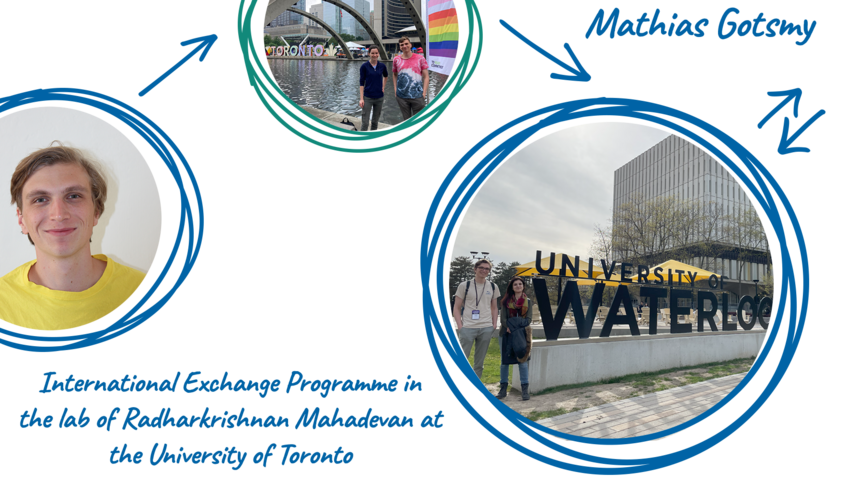
left: Mathias Gotsmy (© M.Gotsmy); up: Mathias with Lisa Panzenboeck a fellow DosChem student in front of the Toronto city call (© M.Gotsmy); right:left to right; Mathias with his colleague at a local conference nearby University of Waterloo (© M.Gotsmy).
Patricia Bortel
Patricia (Christopher Gerner group, Panel B) received the International Exchange Award in 16.01.2023 and spent 3 months in spring 2023 on the project titled "Phosphoproteomic profiling and establishment of LC-MS/MS kinome monitoring assays for the investigation of cellular signal transduction cascades" in the group of Jesper Velgaard Olsen at University of Copenhagen.
Read here about her experience:
Why did you apply for the International Exchange Programme?
I wanted to broaden my skill repertoire in my research area, step outside of my comfort zone and establish a diverse scientific network for future collaboration
What was your project and where did you go? Was the project successful? What was the outcome?
My project was to learn and optimize new, highly sensitive phosphoproteomics techniques and apply them to my in vitro inflammation models for the detection of low abundant phosphorylation sites in signal transduction cascades. I performed my internship at the research group of Prof. Jesper V. Olsen, a pioneer in the research field of phosphoproteomics, at the Novo Nordisk Foundation Center for Protein Research at the University of Copenhagen. My project was highly successful – I greatly broadened my expertise on state-of-the-art phosphoproteomics techniques and am now able to apply them in our lab. I analyzed my inflammation model samples with an optimized phosphoproteomics workflow, yielding deep phosphoproteomes which are now highly beneficial to gain deeper insights into dysfunctional signal transduction cascades, boosting my research project. Moreover, together with the Olsen Lab, we turned the extensive method optimization performed during my internship into an additional publication, adding great novel value to my PhD thesis.
What did you like/did you not like about your International stay? What did you get out of participating in the international exchange? Would you do it again?
There was honestly nothing I didn’t like about my international stay. The environment in the research group I stayed with was super warm and welcoming, I felt like being a proper group member from day one. I received a lot of support from my supervisor(s) in the host lab and they were very considerate of my needs. My host lab was very international and I really enjoyed interacting with people from diverse scientific and personal backgrounds. Besides the numerous scientific benefits already mentioned above, I broadened my network, made new friends and experienced living in a beautiful foreign city. It was an amazing experience and I would definitely do it again.
How did the daily work routine in your host lab differ from the lab in Vienna?
My daily work routine did not greatly differ from my lab in Vienna. I enjoyed having a clearly defined, narrow project goal and working out detailed workplans with my host supervisor.
What advice would you give to students who want to apply to the IE program?
I would advise students who are hesitant whether to go on an International stay to just do it. I was very worried about many things before my stay, but everything turned out perfectly fine and I would have regretted missing out on all my experiences.
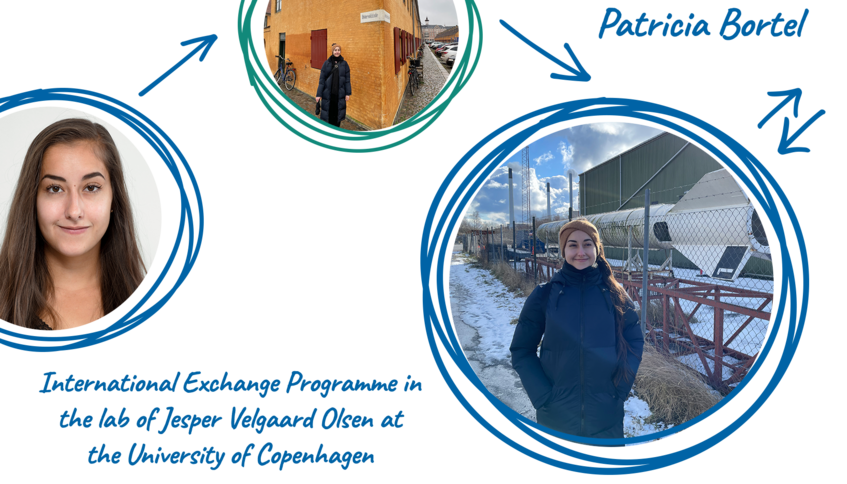
Photos from Patricia during her stay in Copenhagen (©P.Bortel)
Aleksandra Ptaszek
Aleksandra (Robert Konrat, Panel C) received the International Exchange Award in 01.04.2023 and spent 2 months on the project titled "Robust prediction of ¹H NMR chemical shifts in protein-ligand systems" in the group of Teresa Head-Gordon at University of California, Berkely.
Why did you apply for the International Exchange Programme?
I applied for the International Exchange Programme because I wanted to team up with Professor Teresa Head-Gordon lab, aligning closely with my research interests. The programme's 3-4 month duration made it a better fit for me compared to other options that required longer stays and might have been more competitive. As a computational chemist, I saw the benefit of having both face-to-face collaboration and the option to continue working remotely.
What was your project and where did you go? Was the project successful? What was the outcome?
I went to Teresa Head-Gordon lab, University of California, Berkeley. My goal was to learn machine learning methods in application to NMR chemical shifts prediction. Initially, I joint the ongoing in the lab project “Highly Accurate Prediction of NMR Chemical Shifts from Low-Level Quantum Mechanics Calculations Using Machine Learning” which had just been published (10.1021/acs.jctc.3c01256). Alongside, I started the project focused on the prediction of protein side chains NMR chemical shifts using a machine learning approach. This project built upon the existing software developed in the host lab for predicting NMR shifts in the main chain of proteins. I have continued this work online and I am now writing the manuscript.
What did you like or did you not like about your International stay? What did you get out of participating in the international exchange? Would you do it again?
I really enjoyed the research aspect. I learned a lot about machine learning and quantum chemistry, and I gained valuable hands-on experience with programming. Attending the scientific discussions in the host lab and collaborating with the theoretical chemistry group was also inspiring. Plus, UC Berkeley was full of visiting students and researchers, so there were many events and tours organised by the university. Making friends from all over the world and exploring the Bay Area together was amazing!
I would definitely come back to Berkeley!
How did the daily work routine in your host lab differ from the lab in Vienna?
The daily work routine in my host lab at Berkeley was slightly different from that of my lab in Vienna. While my lab in Vienna has a mix of experimental and computational scientists, the lab in Berkeley is entirely computational, allowing for remote work for the entire group from time to time.
Additionally, the location of the Berkeley campus among the redwood trees, with views of the Golden Gate Bridge, along with live music, university orchestra performances, demonstrations, picnics and graduation ceremonies, create a truly American university feel!
However, the sense of safety at Berkeley was not as pronounced as in Vienna. Throughout my stay, I received emails about crimes and even one shotgun attack around the campus.
What advice would you give to students who want to apply to the IE program?
International exchange is a great opportunity to expand your knowledge and network, and have a taste of life on the other side of the world!
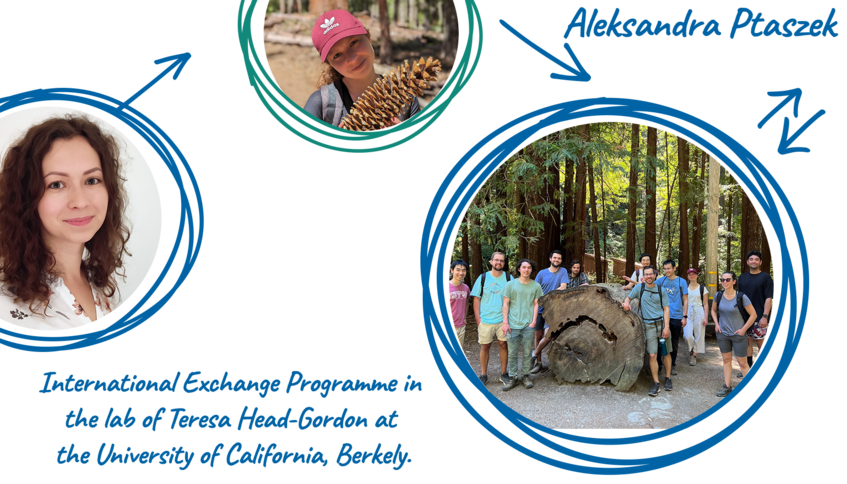
Photos from Aleksandra during her stay in California (©A.Ptastzek)
Yifan Bao
Yifan Bao (group of Marc Pigntter) received the International Exchange Award in 16.01.2023 and spent 2 months in summer 2023 on the project titled "NMR-based Profiling of the Digestive Dynamics of Heated Olive Oil in Mice Gastrointestinal Tract" in the group of Patricia Sopelana Garay at University of the Basque Country.
Read here about her experience:
Why did you apply for the International Exchange Programme?
Unlike many fellowships that offer only one call per year, the DosChem International Exchange Programme stood out with its advantageous frequency of at least three calls annually.
What was your project and where did you go? Was the project successful? What was the outcome?
Regarding my project, titled "NMR-based Profiling of the Digestive Dynamics of Heated Olive Oil in Mice Gastrointestinal Tract," conducted at the University of Basque in Spain, I successfully completed the lab work on time. The analysis of NMR data revealed varying digestive rates and patterns among mice with different diets. Currently, I am integrating NMR data with other information, such as microbial sequencing from Vienna, in the hopes of obtaining more intriguing results.
What did you like/did you not like about your International stay? What did you get out of participating in the international exchange? Would you do it again?
Participating in the international exchange not only broadened my lab skills and technical experiences but also created wonderful memories. If given the opportunity, I would gladly embark on such a journey again.
How did the daily work routine in your host lab differ from the lab in Vienna?
Reflecting on my international stay, I appreciated the working together atmosphere among professors and students in the host lab, there are more professors than students in the lab, that differed from the lab in Vienna
What advice would you give to students who want to apply to the IE program?
I feel so lucky to have embarked on an international exchange through the DosChem budget, acquiring valuable lab skills, technical expertise, and creating cherished memories. I encourage fellow students to take such opportunities, as they can contribute significantly to personal and professional growth.
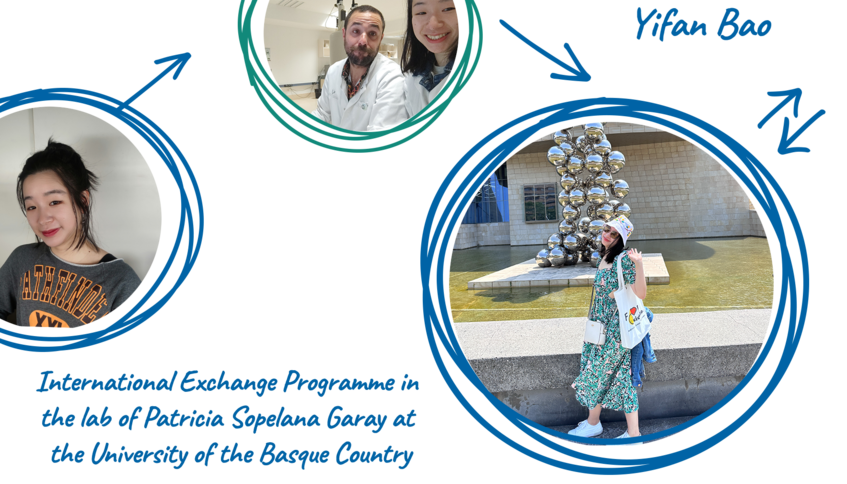
Photos from Yifan from her stay in Basque Country (©Y.Bao)
Martin Schaier
Martin Schaier (the group of Gunda Köllensperger) received the International Exchange Award for the Call 1.10.2023, and spent 2 months on the project titled "Characterizing the skin permeation of contact allergens nickel, cobalt and chromium at the single-cell level through LA-ICP-TOFMS imaging" in the group of Nanna Fyhrquist at the Institute of Environmental Medicine, Karolinska Institutet, Stockholm, Sweden.
Read here about his experience:
Why did you apply for the International Exchange Programme?
Firstly, I wanted to gain experience abroad and experience a different culture before finishing my PhD. Second, I wanted to perform experiments myself for the first time and produce samples before analysis, because then you can see where potential sources of error are right from the beginning. The collaboration with the Karolinska Institute was a good opportunity to do this in a pleasant environment.
What was your project and where did you go? Was the project successful? What was the outcome?
The original plan was to determine skin penetration of chromium III and VI compounds using an ex vivo skin model and compare with other contact allergens like nickel or cobalt. This was an interesting question, given that chromium III is still used in dyeing leather and is currently considered safe, although some studies have shown that the substance penetrates the skin. Unfortunately, nothing has come of this plan, as the chemicals have still not arrived even after several months have passed. However, out of necessity, as the skin samples had already been in transit and needed processing, an even more exciting project was born. We received exciting substances for the incubation study after consulting with other groups. In the end, it became a study of welding nanoparticles collected from different workplaces in Sweden and their potential to penetrate the skin. We also compared them with other nanoparticles such as gold or nickel. This just goes to show that there is much to gain from experimenting in a new environment. In the end, I managed to carry out experiments on all 58 biopsies and cut 300 slides myself. I brought them back to Vienna and they are now waiting to be measured.
What did you like/did you not like about your International stay? What did you get out of participating in the international exchange? Would you do it again?
Stockholm is a beautiful city, very clean, lots of things to do, has many delicious pastries (especially semla and cardamom buns) and doesn't cost as much as it is made out to be (except for rent outside the Karolinska campus). It was easy to integrate into the working group as there were many international colleagues and the working atmosphere was always pleasant. The Karolinska campus offers many opportunities thanks to the many core facilities. The work provided me with many new samples, gave me experience in new areas such as cell culture and histology, and gave me more confidence in my abilities because I was able to work outside my usual lab. You also get to meet a lot of new people and make good contacts, which holds potential for new projects. What might have been somewhat worse at times was that it was rarely sunny and most of the time very cloudy. Along with the early sunset, it can sometimes affect your mood, but it wasn't too bad either.
How did the daily work routine in your host lab differ from the lab in Vienna?
The biggest difference when starting in a new laboratory is that you always have to figure out where all the consumables, chemicals, and equipment are, especially when multiple groups are working in the labs. It can sometimes be challenging to find simpler things like a pH meter. Otherwise, the routine was very similar. What might be very different is the coffee culture. With huge free coffee machines in the kitchens, you're much more tempted to sit down and talk with others over a cup of coffee. Symbolic of this is FIKA, which basically means taking a short break from your work and having coffee and pastries with friends/colleagues. Our group had the tradition that every Thursday at 3 PM was FIKA, and someone always baked something traditional from their home country for everyone, which was a really nice way to interact.
What advice would you give to students who want to apply to the IE program?
Before the journey, I was very afraid of forgetting important things, that everything would become very stressful, or that the new workgroup would scrutinize everything I did very strictly. However, once you arrive in the new city and lab, you realize that it's not all that bad and that perhaps you've overthought many things, so you shouldn't worry too much and just give it a try!
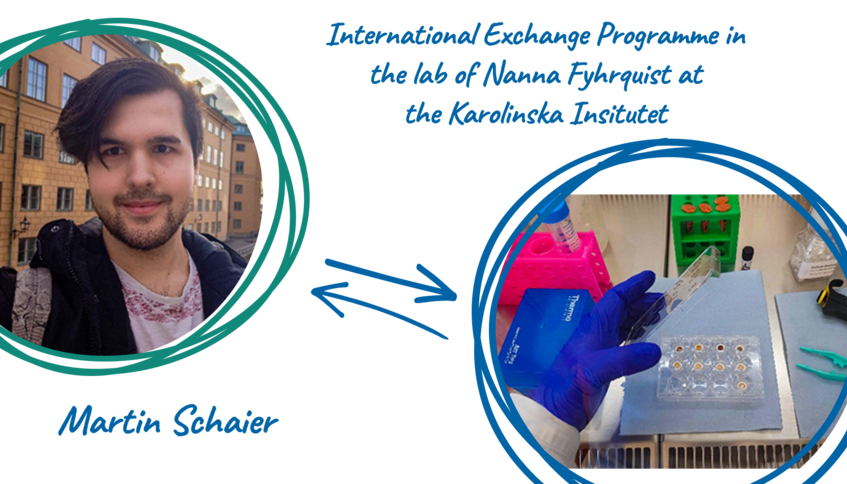
Photos from Martin's stay in Sweden (©M.Schaier)
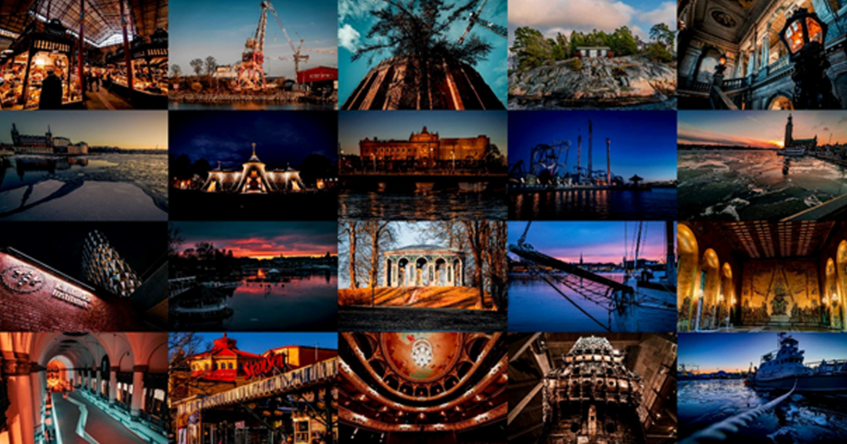
Photos from Martin's stay in Sweden (©M.Schaier)
Nina Nicole Troppmair
Nina Troppmair (the group of Robert Ahrends) received the International Exchange Award for the Call 1.07.2023 and spent 1 month on the project titled "Elucidating the role of sphingolipid synthesis in adipogenesis by high-content imaging and lipidomics" in the group of Mary N. Teruel at the Weill Cornell Medical College of Cornell University.
Why did you apply for the International Exchange Programme?
I saw the DoSChem exchange program as the perfect opportunity to enhance my skills in a different research environment. My primary reason for applying was to conduct essential experiments for my project and broaden my knowledge in this field. Additionally, I aimed to establish a more diverse scientific network, fostering collaboration and exchanging ideas with researchers from varied backgrounds.
What was your project and where did you go? Was the project successful? What was the outcome?
In this project, our aim is to elucidate the role of sphingolipids in adipogenesis. In addition to the MS-based methods well established in our lab, this requires extensive perturbation experiments as well as immunostaining to obtain quantitative differentiation results. I went to the Weill Cornell Medical College of Cornell University in New York, where the group of Mary N. Teruel has exceptional expertise in adipogenesis and adipocyte function, and routinely performs quantitative high-throughput imaging of cells. The data gained from my time there provided new insights into the mechanisms and pathways behind adipocyte formation, perfectly complementing the lipidomic and proteomic analyses performed at our lab in Vienna.
What did you like/did you not like about your International stay? What did you get out of participating in the international exchange? Would you do it again?
Although organizing the international stay was somewhat challenging, it proved to be absolutely worthwhile. The research group I joined was incredibly warm and welcoming, making me feel like an integral part of the team from the very beginning. Having the opportunity to connect with people from around the world, gain insights into their research, and learn directly from their experience was invaluable. Reflecting on my experience, the research stay contributed significantly to both my professional and personal growth. Without hesitation, I would seize the opportunity to participate in such an exchange again.
How did the daily work routine in your host lab differ from the lab in Vienna?
Overall, the daily routine was very comparable to what I am used to, and I would say the workload was similar. However, most group members in NYC worked in the lab every day, including weekends, so I also ended up spending at least some hours in the lab every day. A notable difference was the lab setup. My group in Vienna has several smaller labs and separate offices, whereas in NYC, the entire group shared one large lab and office space. This created a different dynamic, fostering a more collaborative environment. Additionally, their group meetings were highly interactive, with extensive discussions. A particularly nice tradition was the weekly bagel gathering, where the group would meet in the kitchen. This was a wonderful opportunity to interact with colleagues I might not have otherwise engaged with.
What advice would you give to students who want to apply to the IE program?
For those hesitant about an international stay, I encourage you to go for it. Despite my initial worries, the experience was invaluable, providing me with new skills, knowledge, and lasting memories.
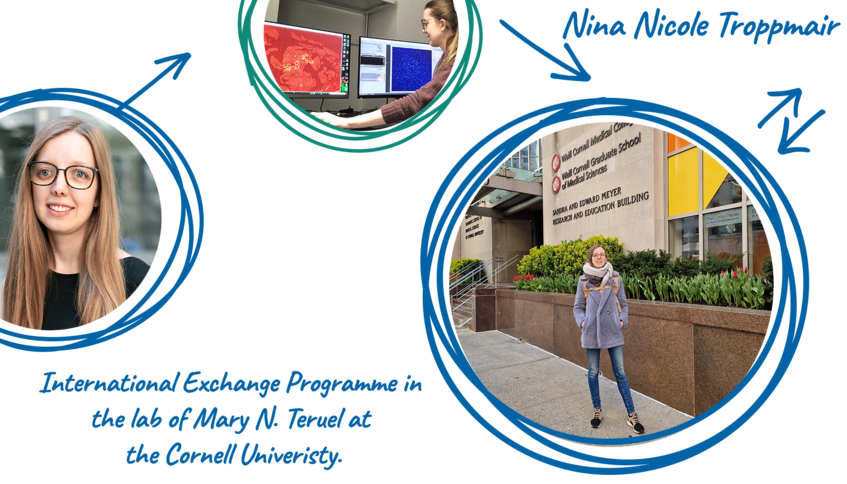
Photos from Nina's stay in USA (©N.Troppmair)
Lisa Panzenboeck
Lisa recieved the International Exchange Award in 2024 for the Call 1.07.2024 and stayed in Stockholm in the lab of Anneli Kruve (Departaments of Materials and Environmental Chemistry, Stockholm University) for the project: Applying machine learning for surrogate standard selection in liquid chromatography high-resolution mass spectrometry metabolomics.
Read below about her experience:
Why did you apply for the International Exchange Programme?
I have always wanted to do a research stay abroad, and this year, everything fell perfectly into place: I was working on a project for which expert knowledge in modeling and machine learning was required, and I knew exactly where I wanted to go. Based on the recommendations of my colleagues Katharina Hohenwallner and Martin Schaier, I knew that the DoSChem International Exchange program would be the optimal choice.
What was your project and where did you go? Was the project successful? What was the outcome?
During my two-month research stay at the Kruve lab at Stockholm University, I worked on a project for automated surrogate internal standard selection in LC-MS-based metabolomics. With the great support of Anneli Kruve and her team (especially Helen Sepman, Wei-Chieh (Harry) Wang, and Louise Malm), I could deepen my knowledge of machine learning and successfully set up a variety of models. Further data evaluation will be performed at the University of Vienna, and we are optimistic that the metabolomics community will benefit from our newly established workflow.
What did you like/did you not like about your International stay? What did you get out of participating in the international exchange? Would you do it again?
Honestly, I can’t think of a single thing that I did NOT like. It was just an amazing experience I would not want to miss. In many fruitful discussions, Anneli and my colleagues in Stockholm helped me to dive deeper into the world of modeling and machine learning, unlock many new ideas, and answered any question that came to my mind with great patience. I had a lot of fun joining them at various group activities, including hiking, laser tag, gingerbread baking (and decorating), many great fikas (coffee breaks), dinners, board game nights, and light festival events. Moreover, Stockholm University is not only located close to a beautiful lake and forest (optimal for nature lovers like me) but also offers a variety of sports activities one can join. The city itself impressed me with its beauty and cleanliness, and it is in close proximity to marvelous little islands. Something I will miss are free coffee refills and Christmas lights in every window to brighten up the rather dark Swedish winter nights.
How did the daily work routine in your host lab differ from the lab in Vienna?
While I sometimes spend many hours in the lab here in Vienna, working with our latest generation MS instruments, my work there was intended to be entirely computational. Apart from this, there was no major difference to my daily routine here, which (if time allows) always includes lunch with amazing colleagues.
What advice would you give to students who want to apply to the IE program?
If you ask yourself if you should/should not do it, go for it.
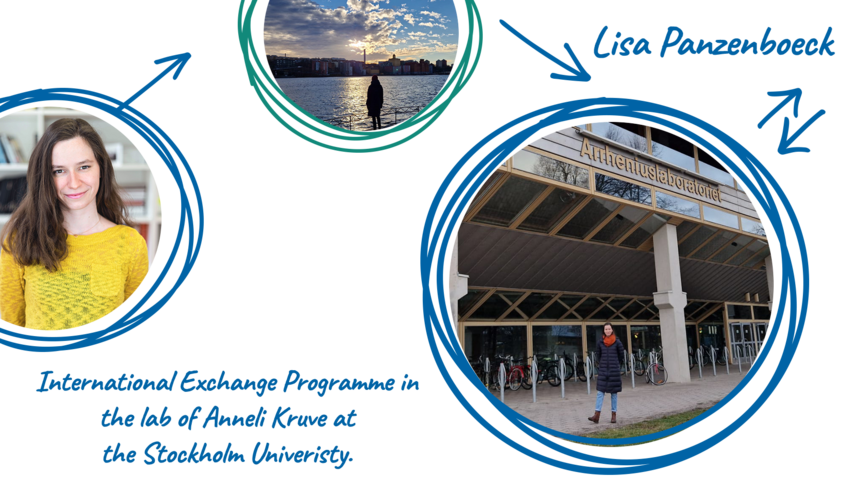
Photos from Lisa's stay in Stockholm. (©LisaPanzenboeck)
